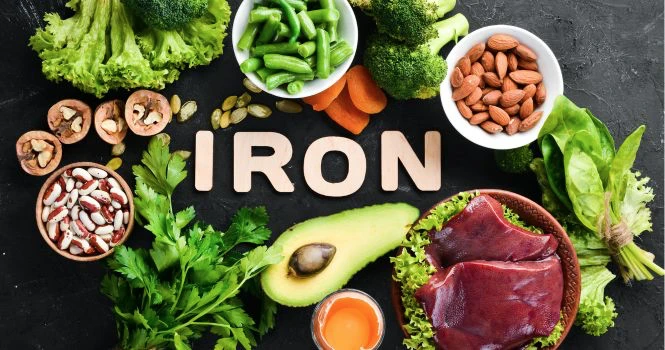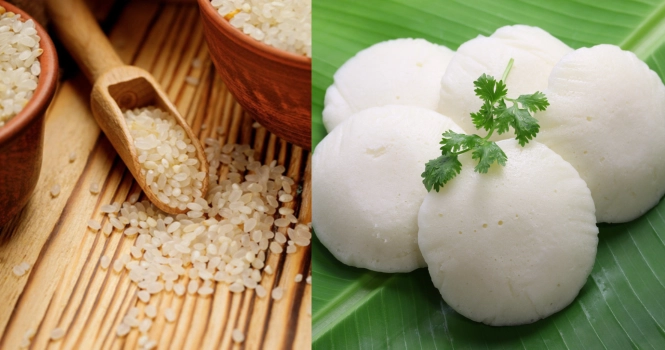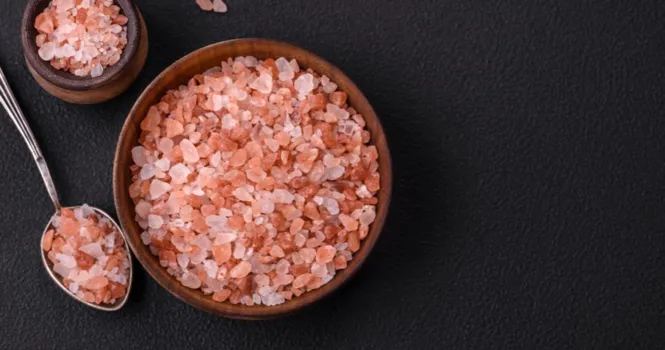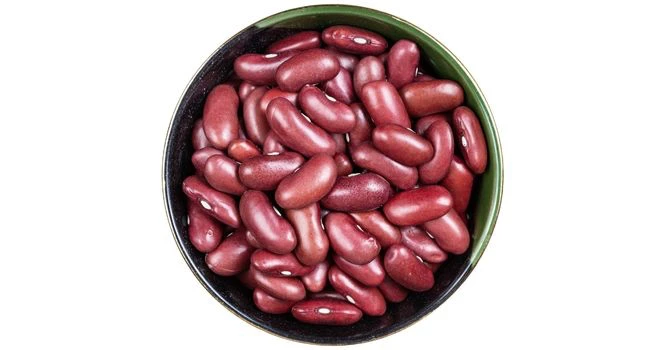Papaya Benefits for Digestion: How This Superfruit Supports Gut Health, Constipation & Weight Loss
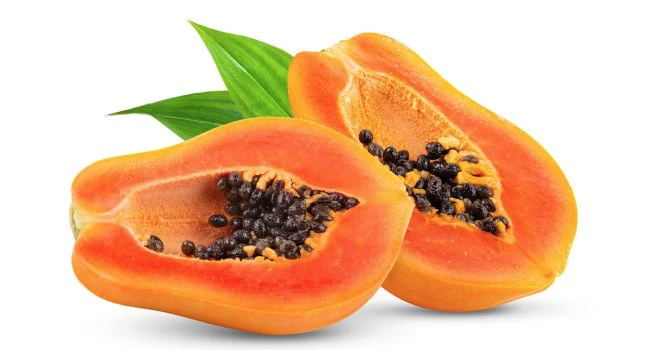
Why Is Papaya a Digestive Superfood?
Papaya is more than just a tropical fruit—it’s a powerful natural aid for digestion. Rich in enzymes, fiber, and essential nutrients, papaya supports gut health, reduces bloating, and helps break down food efficiently. Discover the numerous papaya benefits for digestion that make this fruit a must-have in your diet.
Papain: The Enzyme That Eases Digestion
At the heart of papaya’s digestive benefits is papain, a powerful enzyme that functions similarly to your body’s own digestive enzymes. It helps break down proteins into smaller, more digestible molecules, making it particularly beneficial for those struggling with slow digestion, bloating, or acid reflux (Study).
By enhancing protein breakdown naturally, papain ensures smoother digestion and better nutrient absorption
Key Nutrients That Support Gut Health
Papaya is packed with nutrients that aid digestion and overall gut function:
- Fiber (2.7g per cup): Helps regulate bowel movements and relieves constipation.
- Vitamin C (88mg per cup): Supports gut lining health and reduces inflammation.
- Potassium (286mg per cup): Balances stomach acid levels and prevents bloating.
- Papain Enzyme: Breaks down tough proteins, reducing indigestion and promoting smooth digestion.
What Does Papaya Do for Digestion?
- Relieves Constipation – The high fiber content softens stool and promotes regularity.
- Reduces Bloating & Gas – Papain helps prevent undigested proteins from fermenting, reducing bloating.
- Eases Acid Reflux – The enzyme and alkaline properties of papaya help neutralize stomach acid.
- Promotes Gut Flora Balance – The fiber supports healthy gut bacteria, improving digestion over time.
Eating papaya regularly can naturally improve digestion and make meals easier on your stomach. Whether consumed fresh, blended in smoothies, or taken as papaya enzyme supplements, this fruit is a simple and effective way to support gut health.
Papaya Benefits for Digestion & Gut Health
How Does Papaya Improve Digestion?
Papaya aids digestion in multiple ways, primarily due to its high enzyme activity and fiber content. It helps your stomach process food more effectively, reduces bloating, and supports smooth bowel movements.
How Papaya Aids Protein Digestion?
It contains papain, a powerful enzyme that helps digest proteins faster by breaking them into smaller peptides and amino acids. This process:
- Reduces the workload on your stomach.
- Prevents indigestion caused by undigested proteins.
- Helps people with low stomach acid, bloating, or digestive discomfort.
Because of its protein-digesting ability, papain is commonly used as a natural meat tenderizer and is also found in digestive enzyme supplements.
Does Papaya Help with Constipation?
Yes, papaya is highly effective for relieving constipation.
The high fiber content (2.7g per cup) acts as a natural laxative, softening stool and making bowel movements easier. The fiber absorbs water, adding bulk to stool, which prevents hard, dry stools that cause constipation.
Additionally, papaya contains water and digestive enzymes that keep the intestines hydrated and stimulate smooth muscle contractions, making it easier to pass waste.
For best results, eat ripe papaya in the morning on an empty stomach or consume papaya juice for a quick digestive boost.
Best Time to Eat Papaya for Digestion
Yes, drinking papaya juice can improve digestion and relieve bloating.
Papaya juice retains papain and fiber, making it effective for:
- Soothing an upset stomach after heavy meals.
- Easing acid reflux by neutralizing excess stomach acid.
- Relieving bloating by breaking down undigested food faster.
For maximum benefits, drink fresh papaya juice without added sugar, or blend it with a pinch of ginger and lemon for an extra digestive boost.
Papaya Benefits for Weight Loss & Metabolism
How Does Papaya Help You Lose Weight?
Papaya aids weight loss through three key mechanisms:
- Boosts Digestion & Prevents Bloating – The enzyme papain speeds up protein digestion, reducing bloating and supporting gut health.
- Low in Calories, High in Fiber – Papaya is naturally low in calories while keeping you full for longer.
- Enhances Fat Metabolism – The fruit contains natural compounds that promote fat breakdown, preventing excess fat accumulation.
Does Papaya Burn Belly fat?
Papaya itself doesn’t directly “burn” belly fat, but it supports fat loss in several ways:
- High Fiber Content: Helps regulate digestion and prevents overeating by keeping you full longer.
- Papain Enzyme: Improves protein digestion, allowing the body to use protein efficiently for metabolism and muscle repair.
- Anti-Inflammatory Properties: Reduces bloating and water retention, making your stomach appear flatter.
To maximize belly fat reduction, combine papaya consumption with a healthy diet and regular exercise.
Papaya for Metabolism Boost
Papaya naturally enhances metabolism, helping the body burn calories more efficiently. Here’s how:
- Enzyme Action: Papain aids digestion, ensuring that food is processed quickly and efficiently, preventing fat storage.
- Low-Calorie Density: Papaya provides sweetness without excess calories, making it ideal for weight loss.
- Rich in Antioxidants: Helps reduce oxidative stress and inflammation, both of which slow metabolism.
Eating papaya regularly can increase energy levels and improve fat metabolism, making weight loss more sustainable.
Calories in 100g of papaya & macros
Calories in 100g of Papaya & Macronutrient Breakdown
| Nutrient | Per 100g of Papaya |
| Calories | 43 kcal |
| Carbohydrates | 11g |
| Fiber | 1.7g |
| Protein | 0.5g |
| Fats | 0.3g |
| Vitamin C | 60.9mg (67% DV) |
| Potassium | 182mg |
With just 43 calories per 100g, papaya is a low-calorie fruit perfect for weight loss. It provides essential fiber, vitamins, and minerals while keeping sugar intake moderate.
Papaya vs. Other Fruits for Weight Loss
When it comes to weight loss-friendly fruits, papaya, banana, and pineapple are often compared.
Each has unique benefits, but which one is better for fat loss and digestion?
Papaya vs Banana: Which is better?
Both papaya and banana provide essential nutrients, but they serve different roles in a weight loss diet.
| Feature | Papaya | Banana |
| Calories (100g) | 43 kcal | 89 kcal |
| Carbs | 11g | 23g |
| Fiber | 1.7g | 2.6g |
| Sugar | 5.9g | 12.2g |
| Protein | 0.5g | 1.1g |
| Fat | 0.3g | 0.3g |
Papaya is lower in calories and sugar than bananas, making it a better choice for weight loss. However, bananas provide more sustained energy for workouts
Papaya vs Pineapple for Digestion
Both papaya and pineapple contain powerful digestive enzymes, but they work differently.
| Feature | Papaya | Pineapple |
| Calories (100g) | 43 kcal | 50 kcal |
| Carbs | 11g | 13g |
| Fiber | 1.7g | 1.4g |
| Enzyme | Papain | Bromelain |
| Best For | Constipation relief, gut health | Protein digestion, reducing bloating |
Why Choose Papaya?
- Papain enzyme helps soften stool and improve digestion.
- Lower in sugar and carbs compared to pineapple.
- Reduces bloating naturally.
Why Choose Pineapple?
- Bromelain enzyme helps break down proteins faster.
- Good for post-meal digestion and reducing stomach discomfort.
- Helps with inflammation (useful for post-workout recovery).
For daily digestive health and weight loss, papaya is a better option due to its fiber content and lower sugar. However, if you eat protein-heavy meals, pineapple is better because bromelain speeds up protein breakdown.
Papaya Benefits for Skin & Anti-Aging
Beyond its digestive and weight loss benefits, papaya is a powerful skin-enhancing superfruit. Packed with antioxidants, vitamins, and natural enzymes, it helps maintain a clear, youthful complexion while protecting against signs of aging.
How Does Papaya Improve Skin Health?
Papaya contains skin-nourishing compounds that promote a glowing, blemish-free complexion:
- Vitamin C (88mg per cup) – Boosts collagen production, keeping skin firm and elastic.
- Carotenoids & Beta-Carotene – Protects against sun damage and premature aging.
- Papain Enzyme – Acts as a natural exfoliant, removing dead skin cells for a brighter glow.
- Hydrating Properties – The high water content in papaya keeps skin soft and moisturized.
Whether eaten or applied topically, papaya can rejuvenate skin naturally.
Papaya for Glowing Skin
Regular papaya consumption can improve skin tone, texture, and radiance.
- The antioxidants in papaya neutralize free radicals, which cause dullness and pigmentation.
- Papain enzyme removes dead skin cells, promoting a fresh, even skin tone.
- Vitamin E & Lycopene in papaya reduce oxidative stress, keeping skin supple.
Best Ways to Use Papaya for Skin Glow:
- Eat a bowl of fresh papaya daily for natural skin hydration.
- Apply a papaya face mask (mashed papaya + honey) twice a week for a healthy glow.
Is Papaya Good for Acne?
Yes! Papaya is highly effective for acne-prone skin.
- Papain enzyme reduces inflammation and helps clear clogged pores.
- Natural astringents in papaya help control oil production, reducing breakouts.
- Vitamin A in papaya promotes skin cell renewal, fading acne scars faster.
How to Use Papaya for Acne:
- Spot treatment: Apply fresh papaya pulp on pimples for 15 minutes, then rinse.
- Exfoliating scrub: Mix mashed papaya with oatmeal, gently scrub, and wash off.
- Drink papaya juice daily to reduce breakouts from within.
Does Papaya Reduce Aging Signs?
Yes! Papaya slows down aging by boosting skin elasticity and reducing wrinkles.
- Rich in Antioxidants – Prevents fine lines and sagging caused by oxidative stress.
- Carotenoids in Skin – Shields skin from UV damage and pollution-related aging.
- Collagen-Boosting Vitamin C – Helps maintain firm, youthful skin.
Papaya is a natural skin-enhancing fruit that works from the inside out. Regular consumption and topical application can:
Anti-Aging Papaya Face Mask
Mix mashed papaya, yogurt, and vitamin E oil → Apply for 20 minutes → Rinse for instant hydration and firmness.
- Brighten skin
- Reduce acne
- Prevent premature aging
Adding papaya to your daily routine can keep your skin healthy, radiant, and youthful for years.
Papaya and Diabetes: Can Diabetics Eat Papaya?
Papaya is a naturally sweet fruit, which raises the question:
Is it safe for diabetics?
The answer is yes—when eaten in moderation.
Papaya is a fiber-rich, low-calorie fruit with a moderate glycemic index, making it a diabetes-friendly option when eaten in moderation
Is Papaya Healthy for Diabetics?
Yes, papaya is a healthy fruit for diabetics due to its fiber content, antioxidants, and moderate sugar levels. Unlike high-GI fruits, papaya does not cause sudden blood sugar spikes and offers steady energy release.
- Rich in Fiber (2.7g per cup): Helps slow down sugar absorption, preventing sugar spikes.
- Low in Calories (43 kcal per 100g): Supports weight management, crucial for diabetes control.
- Contains Antioxidants (Carotenoids & Vitamin C): Reduces oxidative stress, which worsens diabetes symptoms.
Eating papaya in controlled portions can be part of a balanced diabetes-friendly diet.
How Does Papaya Affect Blood Sugar?
Papaya contains natural sugars, but its impact on blood sugar is minimal.
| Nutrient (per 100g) | Papaya |
| Total Carbohydrates | 11g |
| Natural Sugars | 5.9g |
| Fiber | 1.7g |
| Glycemic Index (GI) | 60 (Moderate) |
| Glycemic Load (GL) | 5.7 (Low) |
- Fiber slows sugar absorption into the bloodstream.
- Low glycemic load (GL) means it does not significantly impact blood sugar levels.
- Natural enzymes (like papain) support digestion and metabolism, benefiting diabetics.
For best results, pair papaya with a source of protein or healthy fat (like nuts) to further stabilize blood sugar.
Is Papaya Good for Type 2 Diabetes?
Yes, papaya can benefit individuals with Type 2 diabetes due to its ability to:
- Improve insulin sensitivity – Thanks to antioxidants that combat inflammation.
- Regulate blood sugar – Its fiber and enzyme content prevent spikes.
- Support weight control – A low-calorie fruit that helps manage cravings.
Moderation is key—while papaya is beneficial, overconsumption can increase sugar intake unnecessarily
How Much Papaya Should Diabetics Eat?
The recommended portion size for diabetics is ½ cup (75–100g) of papaya per serving. This ensures:
- Controlled sugar intake
- Balanced fiber-to-sugar ratio
- Minimal blood sugar fluctuations
Limit papaya intake to 1-2 small servings per day and pair it with protein or healthy fats.
Glycemic Index of Papaya
Papaya has a moderate glycemic index (GI) of 60, which is lower than high-GI fruits like watermelon and pineapple.
However, the glycemic load (GL) of papaya is only 5.7, meaning its actual impact on blood sugar is low when eaten in moderation.
| Fruit | Glycemic Index (GI) | Glycemic Load (GL) |
| Papaya | 60 | 5.7 |
| Banana | 51 | 13 |
| Watermelon | 72 | 4 |
| Mango | 51 | 8 |
Diabetics should focus on glycemic load (GL), not just GI. Papaya’s low GL makes it safe when portioned properly.
Best time to eat Papaya for Diabetes
Morning vs. Night – Which is Better?
Best time: Morning or midday
- Eating papaya in the morning ensures steady energy release throughout the day.
- Midday consumption helps prevent post-lunch sugar spikes.
Avoid at night
- Sugar metabolism slows down in the evening, increasing the risk of higher blood sugar levels overnight.
- If consuming at night, pair papaya with protein (yogurt, nuts) to prevent sugar spikes.
Morning is the best time for steady energy and digestion, while nighttime intake should be paired with protein to prevent sugar spikes
Papaya for Liver & Kidney Health: Detox Benefits
Papaya is known for its powerful detoxifying properties, making it beneficial for liver and kidney health. Packed with antioxidants, fiber, and essential nutrients, papaya helps cleanse toxins, reduce inflammation, and support overall organ function
How Papaya Detoxifies the Liver
Papaya is a natural liver cleanser, packed with antioxidants, fiber, and enzymes that support detoxification and reduce liver inflammation.
- Rich in Vitamin C & Beta-Carotene – Helps neutralize free radicals, preventing liver damage.
- Papain Enzyme – Aids digestion, reducing the liver’s workload.
- High Fiber Content – Supports the removal of toxins through the digestive system.
- Anti-Inflammatory Properties – Helps reduce fat accumulation and inflammation in the liver.
Best way to consume → Eat ½ to 1 cup of fresh papaya daily to support liver detox and fat metabolism.
Is Papaya Good for Kidney Health?
Yes, papaya can support kidney function by reducing inflammation, flushing out toxins, and maintaining hydration. It is beneficial for overall kidney health due to:
- High Water Content – Keeps the kidneys hydrated and aids toxin removal.
- Natural Alkaline Properties – Reduces acidity in the body, lowering kidney strain.
- Rich in Antioxidants – Protects kidney cells from oxidative damage.
For kidney patients, papaya should be consumed in limited portions due to its potassium content. Excess potassium can be harmful to those with kidney disease.
Best way to consume → Eat small portions (½ cup) in a balanced diet to avoid excessive potassium intake.
Papaya Side Effects: When to Avoid It?
While papaya is packed with health benefits, not everyone should eat it freely. Certain individuals may need to limit or completely avoid papaya due to its effects on digestion, pregnancy, and body heat balance.
Who Should Not Eat Papaya?
1. Pregnant Women (Especially Early Pregnancy)
- Unripe papaya contains high levels of latex, which may trigger uterine contractions and potentially lead to complications.
- Papain enzyme may weaken fetal membranes, increasing the risk of miscarriage.
2. People with Latex Allergies
- Papaya contains natural latex, which can cause allergic reactions like itching, swelling, or breathing difficulties.
3. Individuals with Kidney Disease (Due to High Potassium Levels)
- Papaya is rich in potassium (286mg per cup), which can be dangerous for individuals with chronic kidney disease or on dialysis.
4. People with Hypotension (Low Blood Pressure)
- Papaya has a natural blood pressure-lowering effect. If you have low blood pressure, excessive consumption may cause dizziness or fainting.
5. Those with Gastrointestinal Sensitivity
- Excess papaya can cause diarrhea or bloating due to its high fiber and enzyme content.
Disadvantages of Eating Papaya
Although papaya is generally safe, consuming it in excess may lead to side effects:
- Digestive Issues: Overeating papaya can cause diarrhea, bloating, and stomach cramps due to its high fiber and enzyme content.
- Allergic Reactions: Some people may experience itching, swelling, or difficulty breathing due to papaya’s natural latex.
- Blood Thinning Effects: Papaya may interact with blood-thinning medications, increasing the risk of bleeding.
- Impact on Blood Sugar: While moderate amounts support diabetes management, excessive consumption may cause blood sugar fluctuations.
Tip: Stick to ½ to 1 cup per day for safe consumption.
Papaya and Pregnancy
While papaya is nutritious, unripe papaya can pose risks during pregnancy due to its high latex content—papaya does not act as a birth control method, but it can increase miscarriage risk in early pregnancy.
- Unripe papaya contains high levels of latex, which can cause uterine contractions.
- Papain enzyme in papaya may weaken fetal membranes, posing risks to early-stage pregnancies.
Should pregnant women avoid papaya?
- Unripe papaya should be avoided completely.
- Ripe papaya is generally safe in small amounts, but always consult a doctor before including it in a pregnancy diet.
Papaya is not a natural contraceptive but may pose risks during early pregnancy.
Is Papaya Heat or Cooling to the Body?
Papaya is considered a warm food in Ayurveda, meaning it may increase body heat. If you experience acidity or inflammation, balance it with cooling foods like yogurt or cucumber.
Who should avoid too much papaya?
- People prone to acid reflux, inflammation, or skin breakouts.
- Those experiencing high body temperature, fever, or excessive sweating.
- Pregnant women (due to its potential to raise internal heat levels).
Cooling alternatives? If you feel excessive heat after eating papaya, pair it with cooling foods like cucumber, coconut water, or yogurt.
Papaya is a nutritious fruit but should be consumed in moderation.
- Avoid unripe papaya during pregnancy due to its potential risks.
- Limit intake if you have kidney disease, low blood pressure, or latex allergies.
- If you experience bloating or digestive discomfort, reduce your portion size.
- Balance papaya with cooling foods if you feel excess body heat after consumption.
By consuming papaya wisely, you can enjoy its benefits without unwanted side effects.
How to Eat Papaya for Maximum Benefits
It is a versatile fruit that can be eaten raw, blended, or mixed into meals for optimal health benefits. The best ways to consume papaya are,
- Eat it raw with lemon – Improves digestion and nutrient absorption.
- Blend into a smoothie – Pair with banana, almond milk, and chia seeds for weight loss.
- Add to salads – Combine with cucumber, mint, and lime for a refreshing, fiber-rich meal.
- Drink papaya juice – Mix with orange juice, ginger, and turmeric for a natural detox.
- Pair with yogurt & honey – A gut-friendly snack that supports digestion and immunity.
Best time to eat papaya: Morning or midday for digestion and metabolism boost.
Best way to eat papaya: Fresh slices, with lemon, or in yogurt.
Best way to drink papaya: In smoothies, juices, or detox blends.
Best time to eat papaya: Morning or midday for maximum digestion benefits.
By making papaya a regular part of your diet, you can enjoy its powerful health benefits in a delicious way.
Can You Eat Papaya Seeds?
Papaya seeds are often discarded, but they are actually edible and packed with health benefits. However, they should be consumed in moderation due to their strong compounds and potential side effects.
Papaya seeds Benefits & risks
Health Benefits of Papaya Seeds
Papaya seeds are rich in antioxidants, fiber, and plant-based enzymes that support digestion, liver health, and detoxification.
- Supports Digestion – Contains papain enzyme, which aids in breaking down proteins and reducing bloating.
- Liver Detoxification – High in polyphenols and flavonoids, which help flush toxins from the liver.
- Anti-Parasitic Properties – Contains carpaine, a compound known to kill intestinal parasites.
- Rich in Fiber – Promotes gut health and may help regulate bowel movements.
- Contains Healthy Fats – Includes monounsaturated fatty acids (MUFA), which support heart health.
Risks of Eating Papaya Seeds
While papaya seeds offer many health benefits, excessive consumption may lead to adverse effects:
- Digestive Issues – High fiber content can cause bloating or diarrhea if eaten in excess.
- Toxic in Large Quantities – Papaya seeds contain benzyl isothiocyanate, which may be harmful in high doses.
- Pregnancy Concerns – The compounds in papaya seeds may induce uterine contractions and should be avoided during pregnancy.
- Bitter Taste – Papaya seeds have a strong, peppery flavor, which may not be palatable for everyone.
Safe limit: Stick to ½ to 1 teaspoon of papaya seeds per day to avoid potential side effects.
How to Eat Papaya Seeds Safely
Yes, you can eat papaya seeds, but they must be consumed properly to maximize benefits while minimizing risks.
Ways to Eat Papaya Seeds
- Eat Raw (In Small Amounts) – Swallow a few seeds whole or chew them (they have a spicy, pepper-like taste).
- Blend into Smoothies – Add ½ teaspoon to fruit smoothies for a mild detox effect.
- Grind & Use as a Pepper Substitute – Dried and ground papaya seeds work as a spicy seasoning for salads, soups, or meats.
- Papaya Seed Tea – Boil dried papaya seeds in water and drink as a mild detox tea.
- Mix with Honey – Combining papaya seeds with honey may help balance the bitterness while enhancing their antibacterial properties.
Papaya seeds are an underrated superfood, offering benefits for digestion, liver detox, and gut health. However, they must be consumed in controlled amounts to avoid toxicity or digestive discomfort.
- Best for: Digestion, detox, and parasite cleansing.
- How much to eat: ½ to 1 teaspoon per day.
Who should avoid it? Pregnant women, individuals with sensitive digestion, and those taking blood-thinning medications.
If you’re looking for a natural detox remedy, consider incorporating papaya seeds into your diet—but in moderation!
Frequently Asked Questions
Yes, papaya can be beneficial for colitis due to its anti-inflammatory properties and digestive enzymes. Its high fiber content supports gut health and helps prevent constipation, a common issue in colitis patients, while papain enzyme aids in breaking down proteins, making digestion easier for those with sensitive intestines.
Additionally, beta-carotene and vitamin C help reduce inflammation in the gut lining, promoting overall digestive health. To avoid fiber overload, which may trigger discomfort, it’s best to consume ripe papaya in small portions (about ½ cup).
For optimal health benefits, the recommended daily intake of papaya is ½ to 1 cup (75–150g) of ripe papaya. For digestion and weight loss, consuming ½ cup in the morning is ideal, while for skin health and detox, it works well as a snack or in smoothies.
However, excessive consumption (more than 2 cups per day) may lead to loose stools or diarrhea due to its high fiber content and could cause blood sugar spikes, especially in diabetics.
Yes, eating papaya daily is generally safe and beneficial when consumed in moderation. Its high fiber content supports digestion, prevents constipation, and promotes gut health, while its rich antioxidants and vitamin C help boost immunity and skin health. Additionally, papaya is low in calories and can aid in weight management.
However, excessive intake (more than 2 cups per day) may lead to digestive discomfort, diarrhea, or blood sugar fluctuations, especially for diabetics. Pregnant women should also be cautious with unripe papaya due to its latex content.
